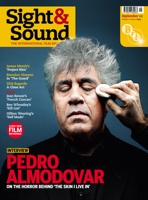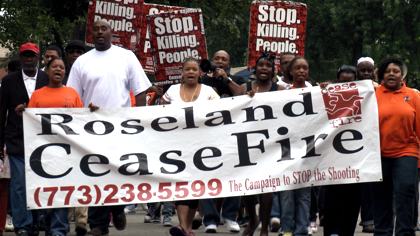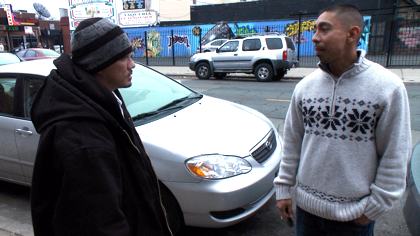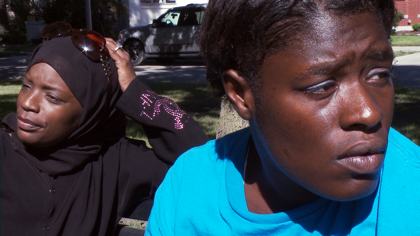Primary navigation


The new film from Hoop Dreams director Steve James chronicles a daring initiative to tackle violence on the streets of Chicago. It’s as compelling as The Wire, says Michael Brooke – and it’s all true
“The story about sticks and stones may break your bones but words can never hurt you? Words are gonna get you killed.” Ameena Matthews has already demonstrated her understanding of this claim’s essential truth by stepping in to break up a fight that started with a young man’s front teeth getting punched out and was threatening to escalate into something much nastier with the appearance of a butcher knife. That this was unexpectedly caught on camera might seem like a stroke of luck for filmmaker Steve James, were it not for the fact that he was spending a year documenting Chicago’s street violence problem, in the course of which encountering a real-life example was statistically far from unlikely.
James’s highest-profile film since Hoop Dreams (1994), The Interrupters began life as an 8,000-word New York Times feature by Alex Kotlowitz, who is credited alongside James as the film’s producer. Published in May 2008, ‘Blocking the Transmission of Violence’ examined attempts to find credible solutions to Chicago’s relentless toll of shootings – a problem exacerbated by a street code of honour demanding swift vigilante justice. One person featured in the article was epidemiologist Gary Slutkin, who had returned to his native Chicago convinced that techniques of disease prevention he’d utilised in Somalia and Uganda could be applied at home, since he regarded street violence as having similar symptoms to an epidemic (it’s certainly the major cause of death for young people in some parts of the city). Slutkin believed that, as with Aids or cholera, encouraging behavioural changes would be far more effective in the long term than medicines or bandages.
Accordingly he founded the community-level campaigning organisation CeaseFire in 2000. In March 2004, CeaseFire started hiring ‘Violence Interrupters’ – people who would use their often considerable clout as either gangland royalty (Ameena is the daughter of Jeff Fort, a high-profile Chicago gang leader imprisoned for domestic terrorism) or veterans of lengthy prison sentences for serious crimes (Ameena’s colleagues Cobe Williams and Eddie Bocanegra, among others).
The theory was that the Interrupters would be far more persuasive than official authority figures, because they self-evidently came from the same background, shared the same concerns and spoke the same language as the people on the street. (In the interests of clarity, The Interrupters occasionally uses subtitles, though they’re sparser and less patronising than with many similar documentaries.) As one Interrupter points out in a meeting in the film: “We’ve got over 500 years of prison time at this table. That’s a lot of fuckin’ wisdom.”

Inspired by Kotlowitz’s article, Steve James spent a year (from summer 2009 to spring 2010) following Ameena, Cobe and Eddie, interviewing them and their colleagues (notably Tio Hardiman, founder of the Violence Interrupters programme) and recording Interrupters meetings. Unusually for a lengthy documentary about an important social issue, James almost entirely ignores politicians and the police; although The Interrupters has garnered justifiable comparisons with HBO’s TV drama series The Wire (2002-8), it mostly stays at street level. Jesse Jackson can be glimpsed briefly at a vigil, while Chicago’s Mayor Richard M. Daley, US Attorney General Eric Holder and US Education Secretary Arne Duncan deliver soundbites at a press conference following the widely YouTubed murder of 16-year-old Derrion Albert; but that’s pretty much it.
Aside from passing patrol cars, the police are even less visible, and Eddie admits that he prefers it this way. The nature of the Interrupters’ work means that they often have to make snap judgements about what they’re interrupting – and their overwhelming priority is to prevent violence. If this cannot be done without allowing concurrent criminal activity to continue, then so be it. Early in the film, Cobe chats to two hooded youths who casually brag about recent crimes, aware that Cobe has himself served a dozen years in prison for drug trafficking and is therefore unlikely to turn them in.
The film offers detailed profiles of Ameena, Cobe and Eddie, which for once don’t amount to biographical padding. We’re given a full portrait of the hijab-wearing Ameena, from her family background to early flirtation with crime to conversion to Islam and marriage to the imam of the Al-Haqqani mosque. (One of the film’s few uncomplicated pleasures is the sight of four red-turbaned men roller-dancing in formation at Ameena’s daughter’s birthday party.) This background helps illustrate both why she became an Interrupter in the first place, and why she’s so good at a job that demands reserves of physical courage, resourcefulness and seemingly infinite patience – as well as the ability to segue seamlessly from huddled one-to-one conversations to crowd-calming speeches. The likeably garrulous Cobe and the wiry, intense Eddie are depicted in similar detail, with the latter’s Latino origins and the presence of white Interrupters at group meetings confirming that the violence isn’t exclusively black on black.
Besides profiling the aims of the Violence Interrupter programme as a whole, the film follows the trio’s handling of a number of individual cases, tracked over several months. These include the Oliver family, whose matriarch Latoya has fled from her sons Kenneth and Bud (a third, unnamed son is in jail until 2016) by moving house without their knowledge; teenagers Caprysha Anderson and Lil Mikey Davis, both already veterans of correctional institutions; and hot-headed Flamo, itching to pay back the perpetrators of an alleged frame-up. The Interrupters also attend vigils for victims and talk to families, friends, relatives and witnesses, all too aware that this is the time when decisions to exact revenge are often irrevocably taken.

The mediation process is painstaking, involving long and potentially fruitless conversations (Tio confirms that “you have to immerse yourself in the bullshit”) and attempts at reconciliation that might well backfire. Latoya says little when reunited with her sons, but her body language could be highlighted in neon. Lil Mikey is palpably nervous before his face-to-face apology to the victims of the armed robbery that got him locked up for nearly three years. Cobe is visibly surprised that Flamo turns his life around, and Ameena is doggedly determined to keep Caprysha on track despite her parole violations. Meanwhile Eddie himself decides to spend a day doing spontaneous good deeds to mark the anniversary of the murder for which he served 14 years.
The Interrupters is a heavyweight film about a heavyweight subject of clear interest well beyond the United States. (While the youth-crime statistics emerging from Britain’s cities may not be quite as hair-raising, they nonetheless show a similar upward trend.) It was clearly made under difficult and potentially dangerous conditions, and James’s invisibility (the camera is barely alluded to) raises inevitable questions about the process by which he gained his subjects’ trust – presumably the subject of a DVD extra or two. It wears its length surprisingly lightly (it’s shorter than Hoop Dreams, but still nearer three hours than two), with individual sequences cut to the quick. Close-ups of an Interrupter’s missing finger, iced-over children’s toys in front of a makeshift street memorial, or the graffitied “I AM NEXT” on a blank brick in a memorial wall, convey as much information as entire conversations.
With interviews and occasional TV and radio news inserts doubling as narration, there’s only one occasion when the film feels forced. It may well have been the case during filming that a shopping mall’s muzak track serendipitously launched into Pachelbel’s ‘Canon’ at the precise moment when Ameena is giving Caprysha an uplifting pep talk, but it feels too pat. The film also lacks Hoop Dreams’ heart-in-mouth narrative arc, but that’s because the earlier film’s protagonists had sufficient talent at basketball to have at least a plausible chance of breaking out of their environment; here, by contrast, James focuses on those who remain straitjacketed within it. In the world of The Interrupters, the mere achievement of securing and holding down a job makes for a low-key but oddly triumphant conclusion.
Vérité visions: Nick James on Albert Maysles and the cream of this year’s Sheffield Doc/Fest (June 2011)
A History of Violence reviewed by Richard Falcon (October 2005)
So good it hurts: Amy Taubin on Fight Club (November 1999)
Soul in the Hole reviewed by Richard Falcon (November 1999)